Comprehensive Analysis of Stress and its Consequences
VerifiedAdded on 2022/10/11
|9
|987
|8
Essay
AI Summary
This essay provides a comprehensive overview of stress, encompassing its definition, common symptoms, and physiological changes that occur within the body when stressed. The essay delves into the effects of stress on the brain, highlighting how stress hormones like cortisol can impair cognitive functions such as memory and learning, while also discussing the potential for recovery in younger individuals. It explores the diverse causes of stress, ranging from emotional turmoil and work-related pressures to chronic illnesses. Furthermore, the essay details various behavioral symptoms associated with stress, including substance abuse, anxiety, and changes in eating habits. Finally, the essay outlines effective treatment strategies, such as seeking support, adopting a healthy lifestyle, engaging in leisure activities, and practicing relaxation techniques like deep breathing and meditation. The essay concludes by referencing key studies and research in the field of stress.
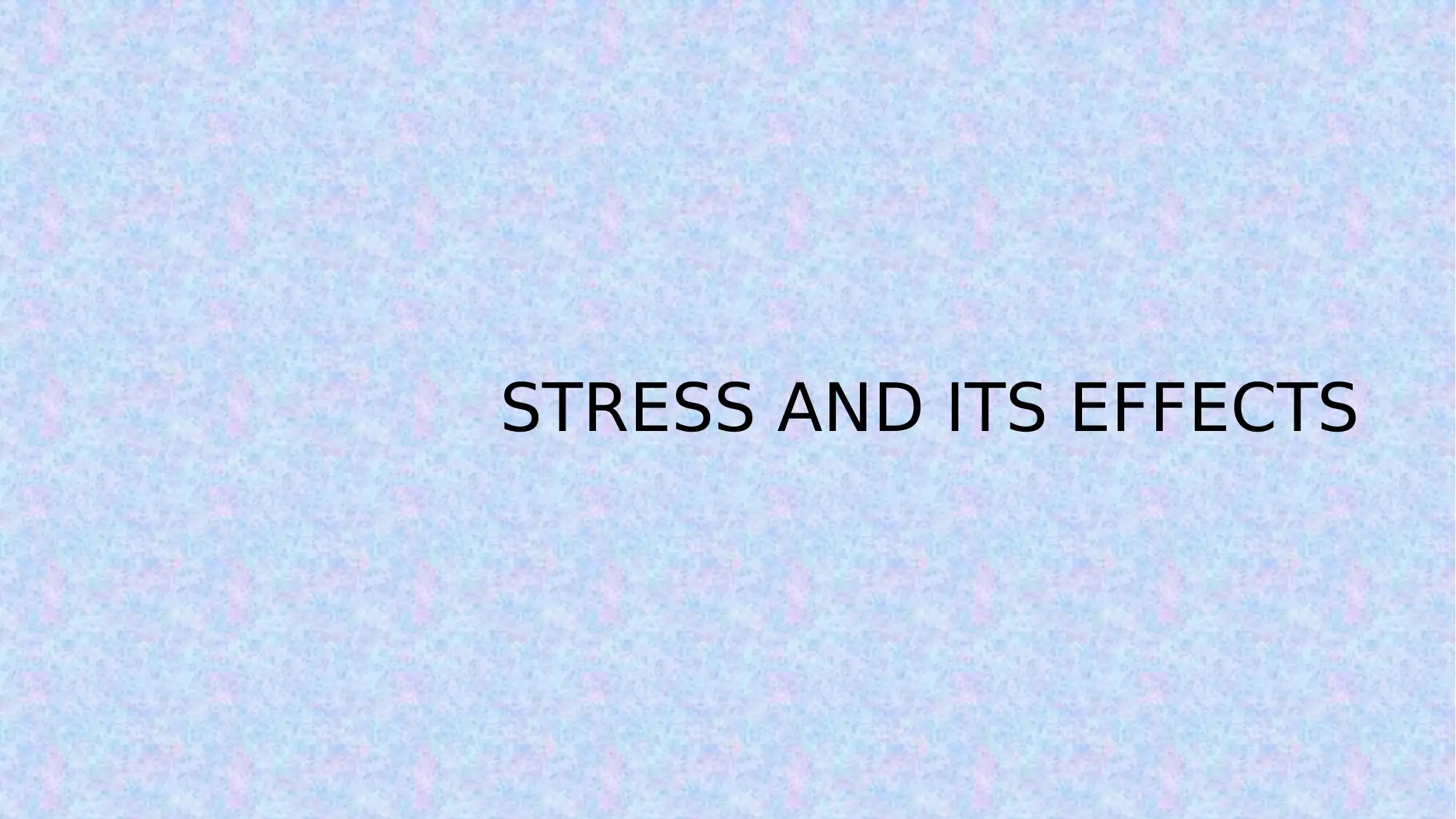
STRESS AND ITS EFFECTS
Paraphrase This Document
Need a fresh take? Get an instant paraphrase of this document with our AI Paraphraser
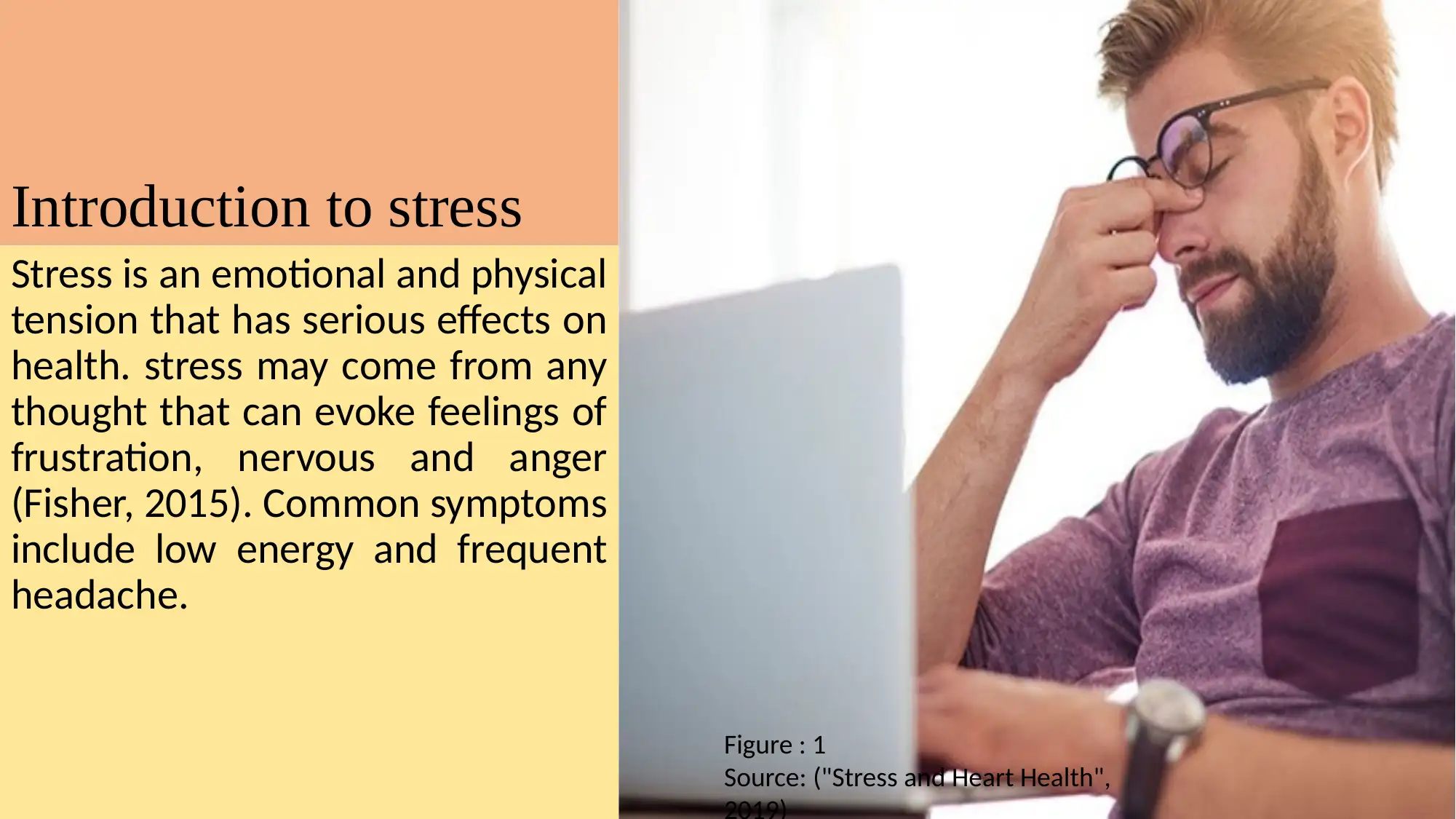
Introduction to stress
Stress is an emotional and physical
tension that has serious effects on
health. stress may come from any
thought that can evoke feelings of
frustration, nervous and anger
(Fisher, 2015). Common symptoms
include low energy and frequent
headache.
Figure : 1
Source: ("Stress and Heart Health",
Stress is an emotional and physical
tension that has serious effects on
health. stress may come from any
thought that can evoke feelings of
frustration, nervous and anger
(Fisher, 2015). Common symptoms
include low energy and frequent
headache.
Figure : 1
Source: ("Stress and Heart Health",
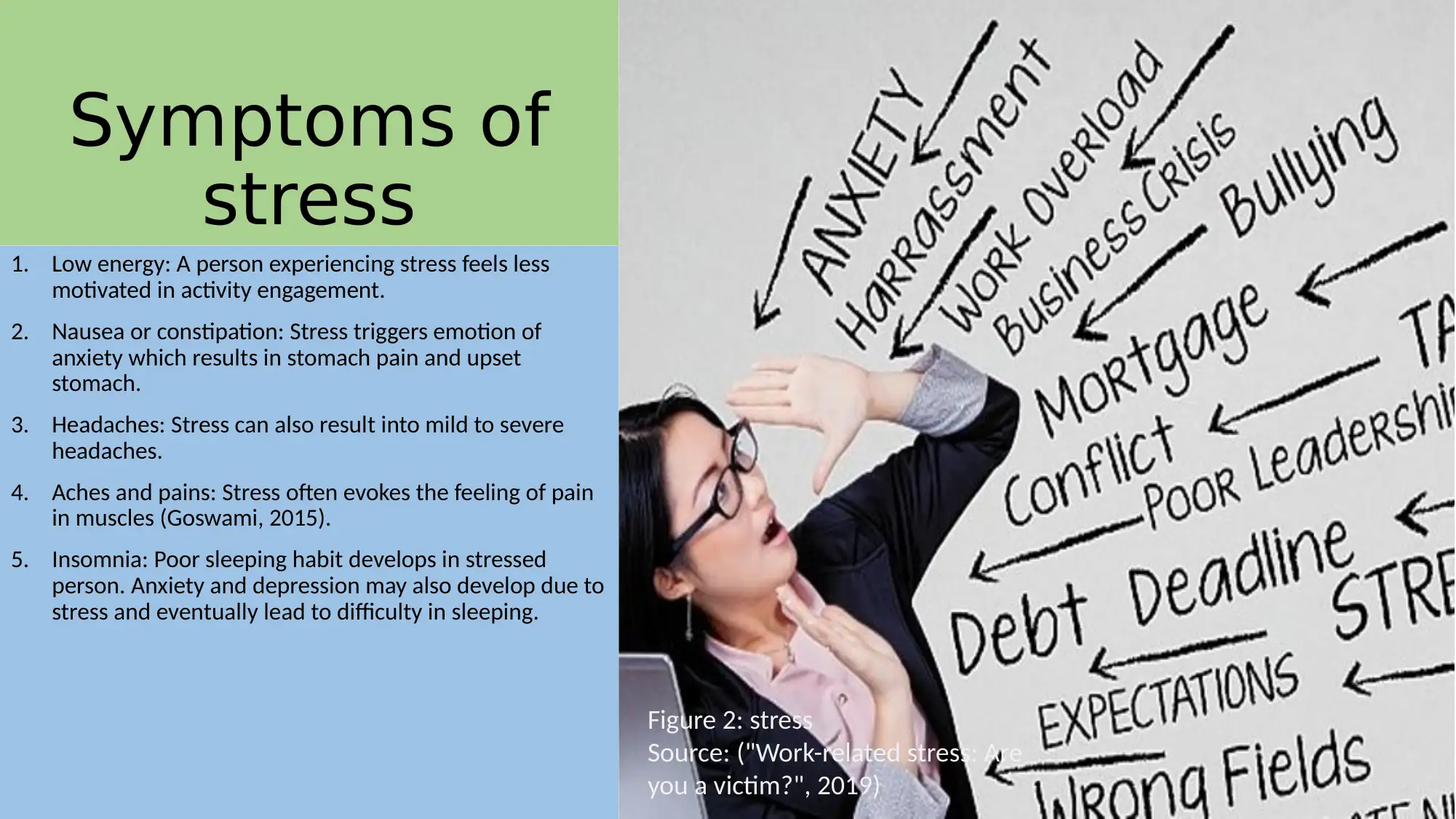
Symptoms of
stress
1. Low energy: A person experiencing stress feels less
motivated in activity engagement.
2. Nausea or constipation: Stress triggers emotion of
anxiety which results in stomach pain and upset
stomach.
3. Headaches: Stress can also result into mild to severe
headaches.
4. Aches and pains: Stress often evokes the feeling of pain
in muscles (Goswami, 2015).
5. Insomnia: Poor sleeping habit develops in stressed
person. Anxiety and depression may also develop due to
stress and eventually lead to difficulty in sleeping.
Figure 2: stress
Source: ("Work-related stress: Are
you a victim?", 2019)
stress
1. Low energy: A person experiencing stress feels less
motivated in activity engagement.
2. Nausea or constipation: Stress triggers emotion of
anxiety which results in stomach pain and upset
stomach.
3. Headaches: Stress can also result into mild to severe
headaches.
4. Aches and pains: Stress often evokes the feeling of pain
in muscles (Goswami, 2015).
5. Insomnia: Poor sleeping habit develops in stressed
person. Anxiety and depression may also develop due to
stress and eventually lead to difficulty in sleeping.
Figure 2: stress
Source: ("Work-related stress: Are
you a victim?", 2019)
⊘ This is a preview!⊘
Do you want full access?
Subscribe today to unlock all pages.

Trusted by 1+ million students worldwide
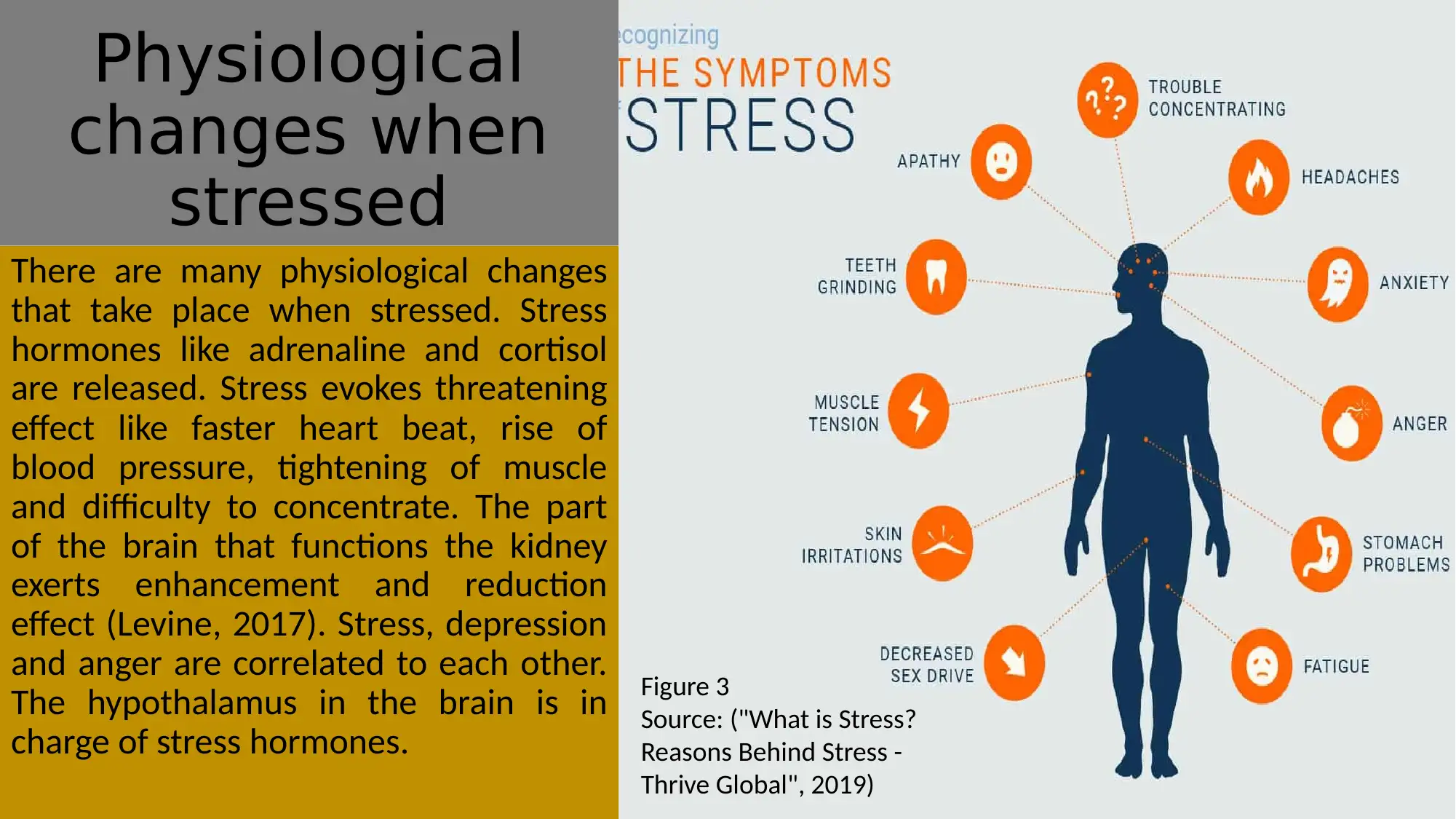
Physiological
changes when
stressed
There are many physiological changes
that take place when stressed. Stress
hormones like adrenaline and cortisol
are released. Stress evokes threatening
effect like faster heart beat, rise of
blood pressure, tightening of muscle
and difficulty to concentrate. The part
of the brain that functions the kidney
exerts enhancement and reduction
effect (Levine, 2017). Stress, depression
and anger are correlated to each other.
The hypothalamus in the brain is in
charge of stress hormones.
Figure 3
Source: ("What is Stress?
Reasons Behind Stress -
Thrive Global", 2019)
changes when
stressed
There are many physiological changes
that take place when stressed. Stress
hormones like adrenaline and cortisol
are released. Stress evokes threatening
effect like faster heart beat, rise of
blood pressure, tightening of muscle
and difficulty to concentrate. The part
of the brain that functions the kidney
exerts enhancement and reduction
effect (Levine, 2017). Stress, depression
and anger are correlated to each other.
The hypothalamus in the brain is in
charge of stress hormones.
Figure 3
Source: ("What is Stress?
Reasons Behind Stress -
Thrive Global", 2019)
Paraphrase This Document
Need a fresh take? Get an instant paraphrase of this document with our AI Paraphraser
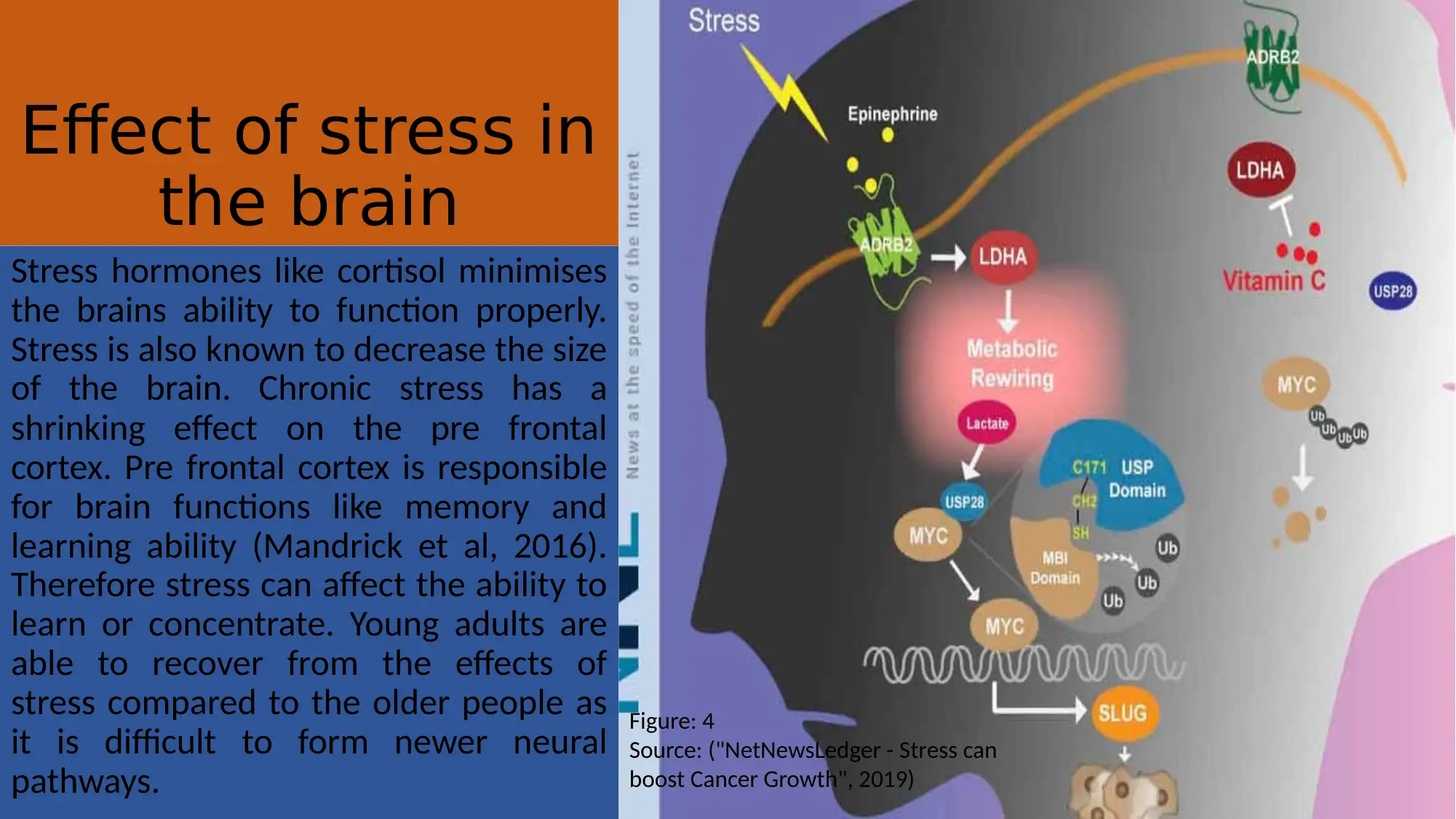
Effect of stress in
the brain
Stress hormones like cortisol minimises
the brains ability to function properly.
Stress is also known to decrease the size
of the brain. Chronic stress has a
shrinking effect on the pre frontal
cortex. Pre frontal cortex is responsible
for brain functions like memory and
learning ability (Mandrick et al, 2016).
Therefore stress can affect the ability to
learn or concentrate. Young adults are
able to recover from the effects of
stress compared to the older people as
it is difficult to form newer neural
pathways.
Figure: 4
Source: ("NetNewsLedger - Stress can
boost Cancer Growth", 2019)
the brain
Stress hormones like cortisol minimises
the brains ability to function properly.
Stress is also known to decrease the size
of the brain. Chronic stress has a
shrinking effect on the pre frontal
cortex. Pre frontal cortex is responsible
for brain functions like memory and
learning ability (Mandrick et al, 2016).
Therefore stress can affect the ability to
learn or concentrate. Young adults are
able to recover from the effects of
stress compared to the older people as
it is difficult to form newer neural
pathways.
Figure: 4
Source: ("NetNewsLedger - Stress can
boost Cancer Growth", 2019)
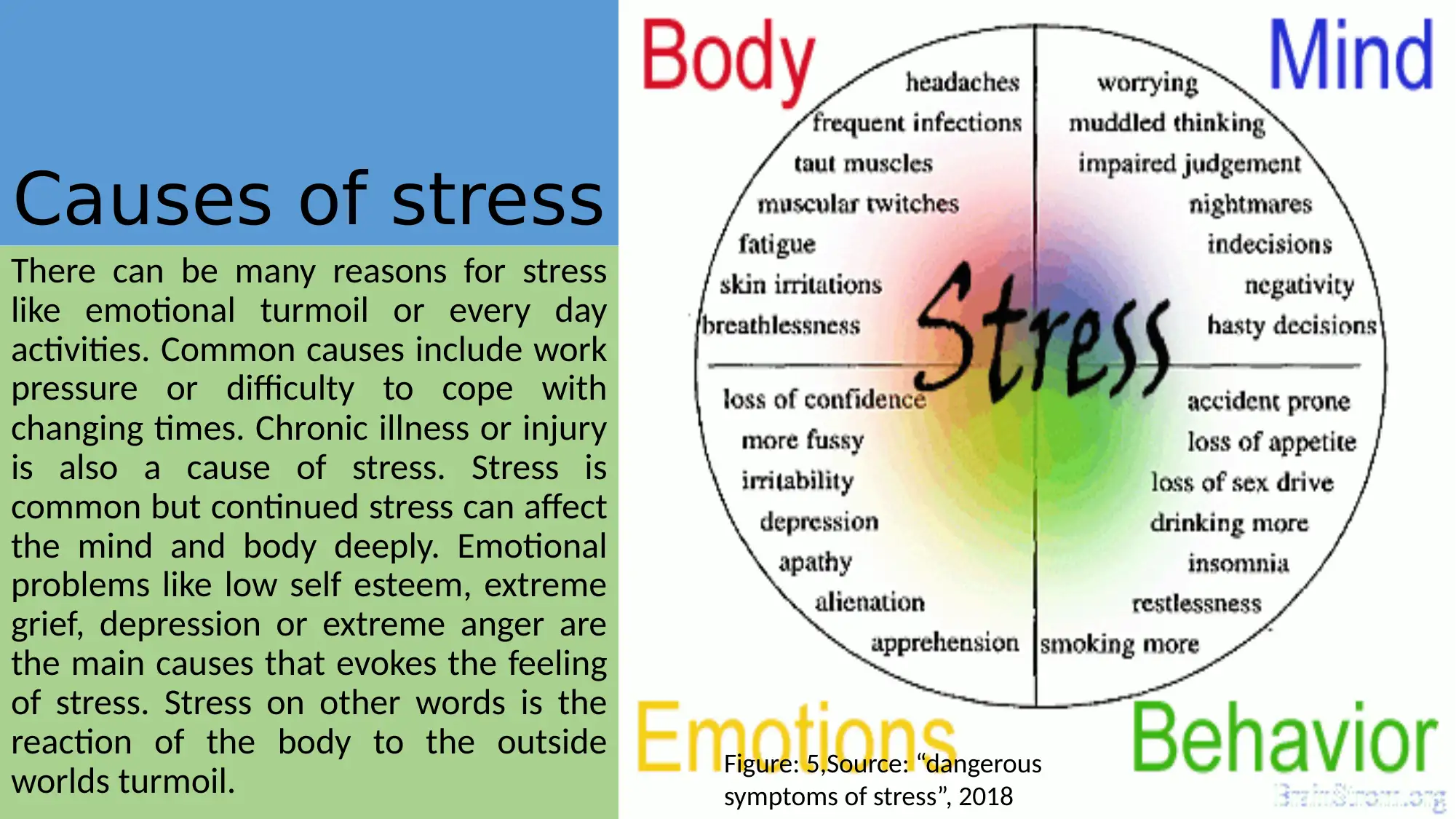
Causes of stress
There can be many reasons for stress
like emotional turmoil or every day
activities. Common causes include work
pressure or difficulty to cope with
changing times. Chronic illness or injury
is also a cause of stress. Stress is
common but continued stress can affect
the mind and body deeply. Emotional
problems like low self esteem, extreme
grief, depression or extreme anger are
the main causes that evokes the feeling
of stress. Stress on other words is the
reaction of the body to the outside
worlds turmoil. Figure: 5,Source: “dangerous
symptoms of stress”, 2018
There can be many reasons for stress
like emotional turmoil or every day
activities. Common causes include work
pressure or difficulty to cope with
changing times. Chronic illness or injury
is also a cause of stress. Stress is
common but continued stress can affect
the mind and body deeply. Emotional
problems like low self esteem, extreme
grief, depression or extreme anger are
the main causes that evokes the feeling
of stress. Stress on other words is the
reaction of the body to the outside
worlds turmoil. Figure: 5,Source: “dangerous
symptoms of stress”, 2018
⊘ This is a preview!⊘
Do you want full access?
Subscribe today to unlock all pages.

Trusted by 1+ million students worldwide
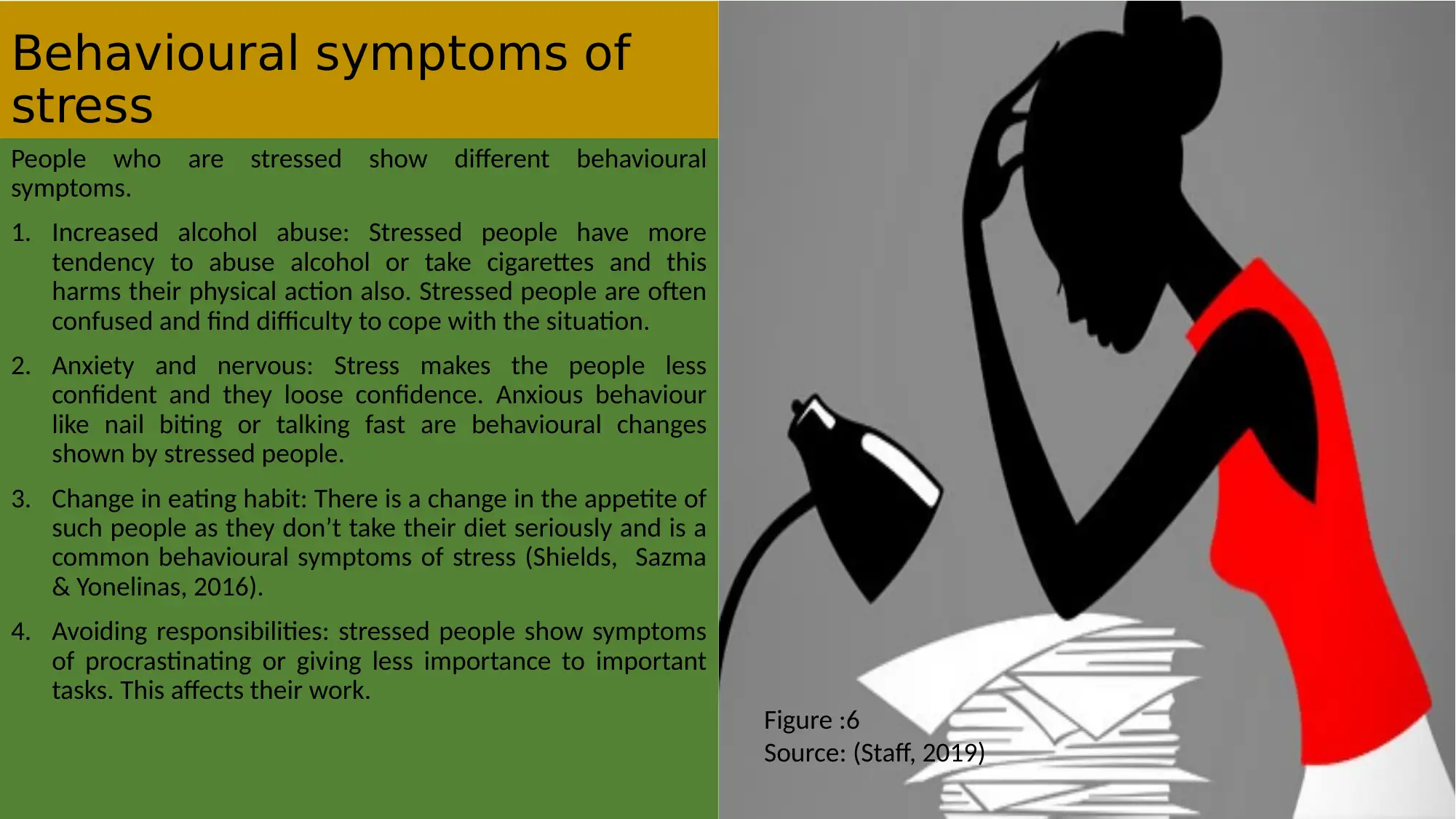
Behavioural symptoms of
stress
People who are stressed show different behavioural
symptoms.
1. Increased alcohol abuse: Stressed people have more
tendency to abuse alcohol or take cigarettes and this
harms their physical action also. Stressed people are often
confused and find difficulty to cope with the situation.
2. Anxiety and nervous: Stress makes the people less
confident and they loose confidence. Anxious behaviour
like nail biting or talking fast are behavioural changes
shown by stressed people.
3. Change in eating habit: There is a change in the appetite of
such people as they don’t take their diet seriously and is a
common behavioural symptoms of stress (Shields, Sazma
& Yonelinas, 2016).
4. Avoiding responsibilities: stressed people show symptoms
of procrastinating or giving less importance to important
tasks. This affects their work.
Figure :6
Source: (Staff, 2019)
stress
People who are stressed show different behavioural
symptoms.
1. Increased alcohol abuse: Stressed people have more
tendency to abuse alcohol or take cigarettes and this
harms their physical action also. Stressed people are often
confused and find difficulty to cope with the situation.
2. Anxiety and nervous: Stress makes the people less
confident and they loose confidence. Anxious behaviour
like nail biting or talking fast are behavioural changes
shown by stressed people.
3. Change in eating habit: There is a change in the appetite of
such people as they don’t take their diet seriously and is a
common behavioural symptoms of stress (Shields, Sazma
& Yonelinas, 2016).
4. Avoiding responsibilities: stressed people show symptoms
of procrastinating or giving less importance to important
tasks. This affects their work.
Figure :6
Source: (Staff, 2019)
Paraphrase This Document
Need a fresh take? Get an instant paraphrase of this document with our AI Paraphraser
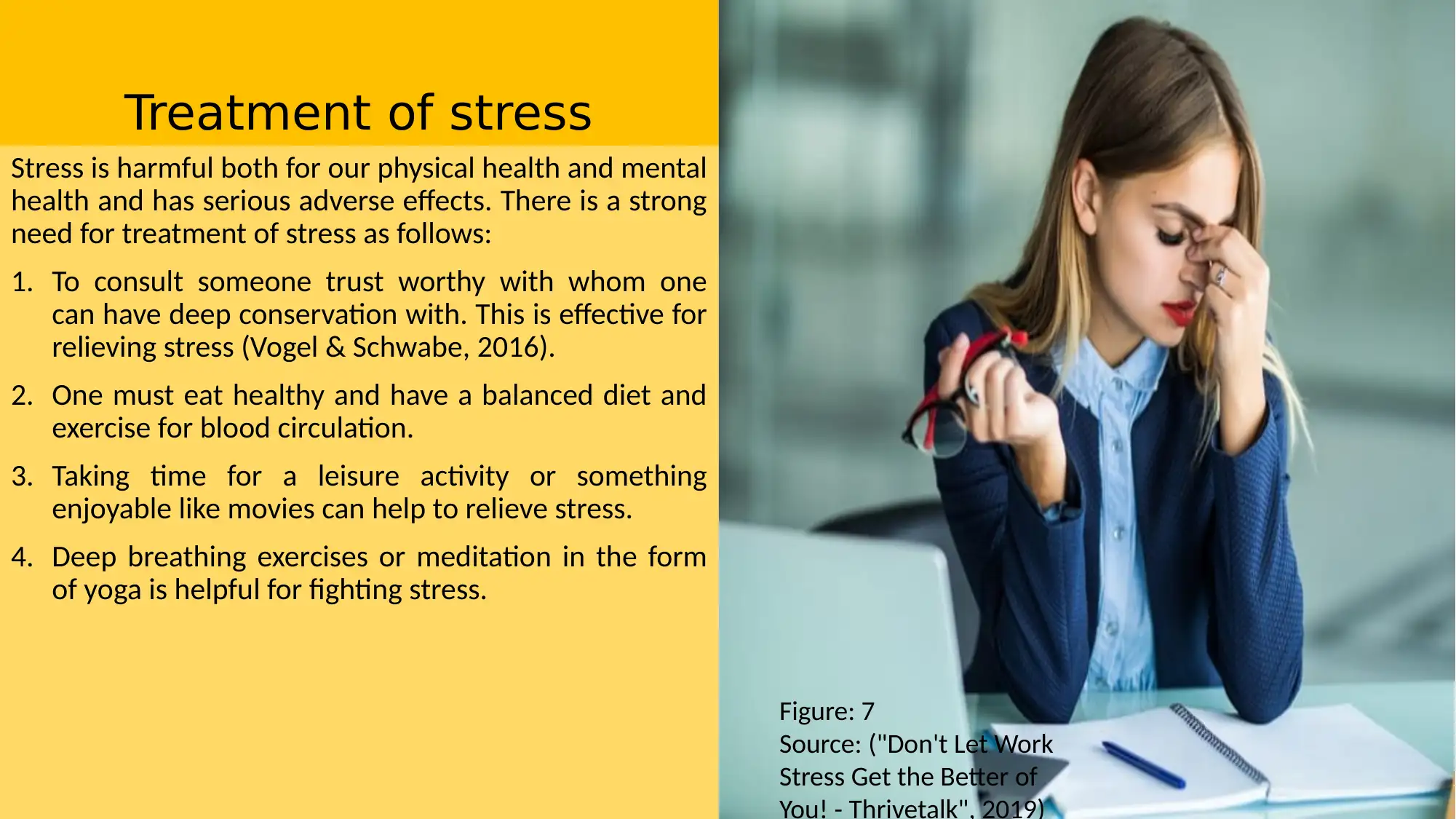
Treatment of stress
Stress is harmful both for our physical health and mental
health and has serious adverse effects. There is a strong
need for treatment of stress as follows:
1. To consult someone trust worthy with whom one
can have deep conservation with. This is effective for
relieving stress (Vogel & Schwabe, 2016).
2. One must eat healthy and have a balanced diet and
exercise for blood circulation.
3. Taking time for a leisure activity or something
enjoyable like movies can help to relieve stress.
4. Deep breathing exercises or meditation in the form
of yoga is helpful for fighting stress.
Figure: 7
Source: ("Don't Let Work
Stress Get the Better of
You! - Thrivetalk", 2019)
Stress is harmful both for our physical health and mental
health and has serious adverse effects. There is a strong
need for treatment of stress as follows:
1. To consult someone trust worthy with whom one
can have deep conservation with. This is effective for
relieving stress (Vogel & Schwabe, 2016).
2. One must eat healthy and have a balanced diet and
exercise for blood circulation.
3. Taking time for a leisure activity or something
enjoyable like movies can help to relieve stress.
4. Deep breathing exercises or meditation in the form
of yoga is helpful for fighting stress.
Figure: 7
Source: ("Don't Let Work
Stress Get the Better of
You! - Thrivetalk", 2019)
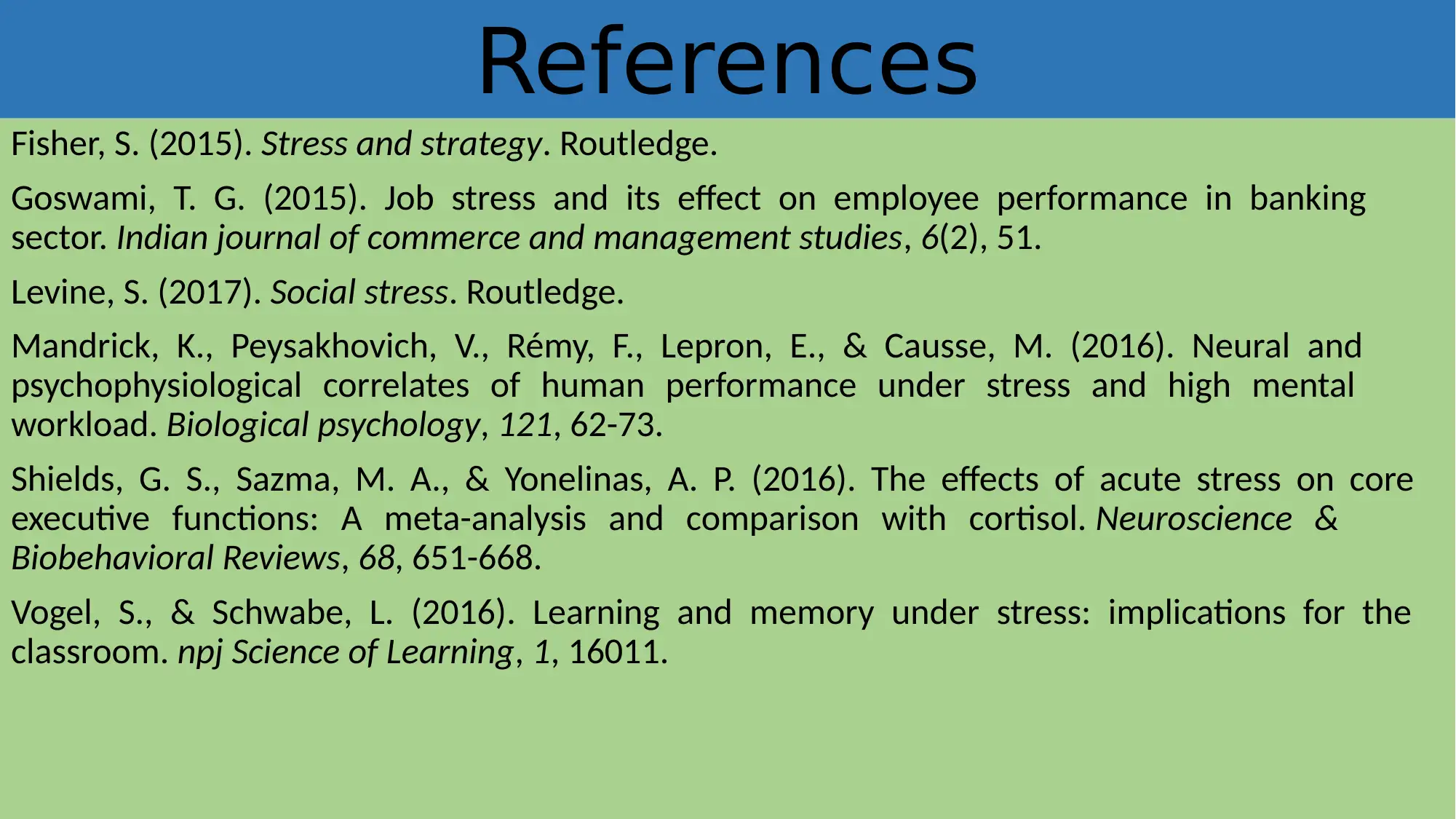
References
Fisher, S. (2015). Stress and strategy. Routledge.
Goswami, T. G. (2015). Job stress and its effect on employee performance in banking
sector. Indian journal of commerce and management studies, 6(2), 51.
Levine, S. (2017). Social stress. Routledge.
Mandrick, K., Peysakhovich, V., Rémy, F., Lepron, E., & Causse, M. (2016). Neural and
psychophysiological correlates of human performance under stress and high mental
workload. Biological psychology, 121, 62-73.
Shields, G. S., Sazma, M. A., & Yonelinas, A. P. (2016). The effects of acute stress on core
executive functions: A meta-analysis and comparison with cortisol. Neuroscience &
Biobehavioral Reviews, 68, 651-668.
Vogel, S., & Schwabe, L. (2016). Learning and memory under stress: implications for the
classroom. npj Science of Learning, 1, 16011.
Fisher, S. (2015). Stress and strategy. Routledge.
Goswami, T. G. (2015). Job stress and its effect on employee performance in banking
sector. Indian journal of commerce and management studies, 6(2), 51.
Levine, S. (2017). Social stress. Routledge.
Mandrick, K., Peysakhovich, V., Rémy, F., Lepron, E., & Causse, M. (2016). Neural and
psychophysiological correlates of human performance under stress and high mental
workload. Biological psychology, 121, 62-73.
Shields, G. S., Sazma, M. A., & Yonelinas, A. P. (2016). The effects of acute stress on core
executive functions: A meta-analysis and comparison with cortisol. Neuroscience &
Biobehavioral Reviews, 68, 651-668.
Vogel, S., & Schwabe, L. (2016). Learning and memory under stress: implications for the
classroom. npj Science of Learning, 1, 16011.
⊘ This is a preview!⊘
Do you want full access?
Subscribe today to unlock all pages.

Trusted by 1+ million students worldwide
1 out of 9
Related Documents
Your All-in-One AI-Powered Toolkit for Academic Success.
+13062052269
info@desklib.com
Available 24*7 on WhatsApp / Email
![[object Object]](/_next/static/media/star-bottom.7253800d.svg)
Unlock your academic potential
Copyright © 2020–2026 A2Z Services. All Rights Reserved. Developed and managed by ZUCOL.




